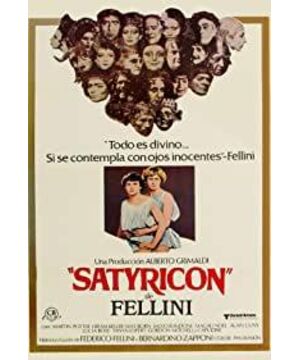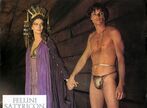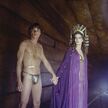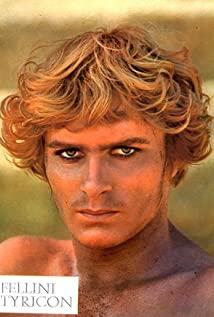"Satilicon" is a novel written in the first century AD. It is said to have been written by Petronius Albitero, a close friend of the reckless Roman emperor Nero. It describes Encor in a witty style. Pio's twists and turns are complex, with stories interconnected for the purpose of entertainment.
Fellini's film is based on this novel, but it is not completely adapted according to the content of the novel, and the adaptation is relatively free. Fellini said before shooting this film that he would make this film into a science fiction film, because we already know nothing about the situation of ancient Roman society, and we can only reproduce the civilization of ancient Rome according to our imagination. . Fellini believes that the ignorance of ancient Rome is not only due to the age of . The film does not make moral judgments on the civilization of ancient Rome, but only shows the picture of pleasure in time, which is very convincing in itself.
Encorpio is the protagonist of the film. He is a young and beautiful young man with strong vitality. He pursues joy and tries his best to satisfy his desires, which are physical desires, not spiritual ones. However, he could neither get spiritual satisfaction nor physical pleasure, he was an unfortunate person. From the very beginning, Encorpio was anxiously searching for his lover by the public bath, which foreshadowed his misfortune.
According to records, the baths in ancient Rome were not just places for bathing, but also places for nobles to exchange information, exchange feelings, and have fun. Sure enough, his lover was "communicated" away in such a public place, and it wasn't anyone else who stole his lover, but his friend Ahirto. This Ahirto did not hide it, and said happily that he and her "had a comfortable night" and that the little girl was "gentle and sweet". Ahirto's mind is only for pleasure, only to satisfy the desires of his flesh, and he does not take friendship to heart at all. His creed is that friendship "speak only when it is good for me." Encorpio lost not only his lover but also his friendship. His pursuit starts from the loss of everything, and what is the final result?
Encorpio learned that Gitone, who fled with Acherto, did not live with Acherto, but was sold to the troupe. Encorpio chased after the theater, and after reasoning and fighting, finally got his lover, and together they came to the mansion that looked like hell. At this time, his misfortune came again: Achierto, who was chasing after him, wanted to "split" Gitone from him. A living person is naturally inseparable. Gitone, who was in the middle of the night, chose Ahirto, and Encorpio fell to the point where he could only commit suicide with a knife. However, just as he was about to commit suicide, the earth trembled and he failed to commit suicide.
The contradictions in the world are so absurd: the earthquake that caused great disaster to others actually saved this unfortunate person. He met the old philosophical poet, whom he regarded as his "only friend," who also said that if he were rich, he would give Encorpio a large ship full of things. It looks like it's time for Ncorpio to turn around. However, the poet is not rich, and can only leave him "the sun, the wind, the sea, and the river." However, fate seems to have taken a turn for the better: at this moment, the Gitone he was looking for came to him, and he was really lost, and he said happily: "I love you, although you have abandoned me, but I... I still... I love you." Unfortunately, as soon as he finished speaking his heartfelt words, Gitone was taken away. Even more unfortunate is that even Encorpio himself was captured, made a slave, and forced to be someone else's "wife". Things are so tortuous, so absurd, because of his ill-fated fate.
The mutiny of Caesar's soldiers gave Encorpio another chance. He escaped from the ship and unexpectedly got a woman after going through hardships. However, when he was happy to get close to the woman, the woman was furious and called him "disgusting". He insisted on having sex with this woman, but as a result he found himself impotent and unable to enjoy the pleasures of the flesh. He went to heal, and it turned out that Ahirto, who accompanied him, was like a fish in water among the women, while his own disease did not improve. Under the guidance of the old poet, he found the woman who could "turn water into diamonds" and hoped that he could recover under her hands, but in the end, the woman killed the strong Ahirto on the spot. At this time, although Ncorpio could breathe a sigh of relief and ask Ahirto's corpse where his happiness and strength were, but that's all, he couldn't recover by himself, there was nothing he could do but On the old poet's ship sailed to an unknown city. His final result: no end.
Encorpio's experience is tortuous, it can be said that it is a lot of hardships and dangers. The film fully describes his experiences, giving the audience a strong impression. At the same time, it also makes people feel that his experiences are like centuries, and human life seems to last a long time. But the film's finale is symbolic: the surviving Ncorpio scowls as he boarded the missing ship, his image transformed into a mosaic on a stone pillar by the sea painting, he became a character in the painting. After the audience followed the movie screen in one breath to follow the protagonist's long and tortuous experience, they suddenly saw that the protagonist had become a figure in a painting, a living person who was going through twists and turns suddenly stopped, his Life has frozen. It turns out that human life is short-lived, just a moment in history, just a small picture in the long scroll of history.
Contrary to the unfortunate Ncorpio, Ahirto's fate seems to be good, and it seems to be handy everywhere. In fact, is he really lucky? Yes, he had the upper hand in the competition with his friend for the handsome young Gitone. He first stole Gitone from a friend, and he had a "comfortable night" with her, enjoying himself. After battling Ncorpio, he managed to go with Gitone. However, he did not regard friendship as the most precious thing, nor the most precious thing in the lovers, and he sold Gitone to the troupe. When he saw Gitone again, the latter chose him, much to his delight, and he had Gitone in his hands again, and fate had been gracious enough to him. What's even more pleasing to this playboy is that he can be loved by women wherever he goes. The black woman in the palace, who was crying, burst into laughter when she saw him, winked at him, and made love to Ncorpio in the pool without avoiding him. When accompanying Ncorpio to the Garden of Eden for treatment, the women treated Ncorpio by hitting him on the back and buttocks with wooden boards, while Ahirto was able to mate with the women here. . This playboy can be said to get his wish everywhere. However, his death was sudden: a sudden death on the verge of a tragic death. Encorpio's question of "where have you been so happy and strong?" is a summary of his life: his life was also fleeting, and his fate was unfortunate.
Contrasted with the two unfortunate youths is the extravagance of the nobles. They are rich, they are absurd, they get something for nothing, and they live in indulgence. The film mobilizes various methods to depict the grand banquet of the rich man Tri Marchionne from multiple angles. Here, the nobleman can exert great power: he blames the servant for the pig without horns, which is really ignorant and domineering. Extreme! This nobleman, who never stood up when he was feasting, drinking, and prostitution, finally got off the couch and stood up when the women gathered around. He not only kissed these women, but also made out with a beautiful young man, and in front of them. In the face of the host, when the hostess quarreled with him, not only did he not admit his fault, but instead he threw the food on her face, which was really shameless and depraved! When the poet said that the nobleman was not an artist, the rich man who originally called the poet a friend ordered the poet to be thrown into the furnace. How cruel! Such a well-to-do, unrestrained, arrogant and cruel person should say that everything is going well, right? However, his heart is empty, he has his worries, which always haunt him: he is afraid of death. He was drunk, and in front of the skeleton, his worries unconsciously revealed: "In the end we all have to die, and we all have to be like this." I really can't enjoy this kind of abundance in another world when I die.
His act of bringing people to see his grave on a whim also revealed his mental state of fear of death. On the one hand, the nobles ate and drank wildly, and on the other hand, they were always worried about the imminent death. This was the most unbearable torment and torture. The more they can do whatever they want, the more they hope to be like this forever, and the more they worry about the coming of death, and they worry more than ordinary people. So they tried everything they could to drive death away, but there was no certainty about it, so they went to the other extreme: suicide, as was the case with the noble couple. In short, the nobles who seem to be able to do whatever they want are also unfortunate, and they are more unfortunate than ordinary people.
Fellini's film does not comment on the moral principles of ancient Rome. Encorpio's infatuation with women is not criticized. He is not criticized for being sent as a "wife." It is expressed as the customs of the time, and no ancient customs are used to insinuate the modern society. However, the film shows the vices and evils of ancient society meticulously and multi-facetedly, depicts the worries and misfortunes of the nobles who are indulging in lust, and also depicts the misfortunes and short lives of people like Encorpio , this film cannot but be said to be an important stage in Fellini's journey towards the question of real society.
Fellini himself said, "What makes us go deep into the heart of the individual? It is the emotion of the many passing years." The days of ancient Rome passed away, and he described these not directly compared with today's society, but the worries of the nobles The misfortunes of Encorpio and others are the inner world of the individual that Fellini is looking for, and these cannot help but raise the question: Are today's people who are looking for joy and extravagance very happy? Is there no doubt that today's society is compared with the ancient society? The answer is self-evident. Fellini is known as the "Italian film genius" and the second generation of "new realist poets". He has written about the tragic fate of the underprivileged and explored the ideological emptiness of the upper class bourgeoisie. This film and 1976's "Casanova" narrated the life and death of human beings. Although they are not directly implied in modern society, they are an exploration of human's inner world and social prospects. This is because, he sees, "In Italy, we are a group of people with confused minds, a mixed bag of different religions and a mixed bag, and our ship is sinking. . . . In a dark purgatory. . . We are ignorant of the future." Fellini was suspicious of society, so he went to explore.
View more about Fellini Satyricon reviews











